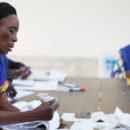Confucius and the Curate’s Egg: The Morality of China in Africa – a review by Keith Somerville

 It is oddly appropriate that in reviewing a book that expends many pages in slightly obscure, not always enlightening and often whimsical accounts of the philosophy of Confucianism and folk tales of the Middle Kingdom, that I should employ a very English euphemism taken from a Punch cartoon from the Victorian era to characterize it. For those who don’t know the cartoon, it shows a young Church of England curate at breakfast with his bishop. The curate’s egg is bad – but so as not to slight his superior he insists that parts of it are excellent. That is rather the case with Stephen Chan’s book looking at the morality of China’s relations with Africa.
It is oddly appropriate that in reviewing a book that expends many pages in slightly obscure, not always enlightening and often whimsical accounts of the philosophy of Confucianism and folk tales of the Middle Kingdom, that I should employ a very English euphemism taken from a Punch cartoon from the Victorian era to characterize it. For those who don’t know the cartoon, it shows a young Church of England curate at breakfast with his bishop. The curate’s egg is bad – but so as not to slight his superior he insists that parts of it are excellent. That is rather the case with Stephen Chan’s book looking at the morality of China’s relations with Africa.
Having worked through it over a couple of days there were a few passages that were excellent but I was not convinced in the end that this would enable me to be as diplomatic or perhaps as obsequious as the curate. But I did feel that a little whimsy was appropriate as so much of the book has a strange, whimsical character that does not always sit well with the seriousness of the subject.
I do always worry when a book about Africa has in the title the words “Dark Continent”. It smacks of the sarcastic advice Binyavanga Wainaina gave to writers about Africa in his well-known Granta article in 2005 – darkness was a metaphor he clearly thought people should avoid. Stephen Chan, I’m sure, intends its use to highlight some of the less sophisticated Chinese views that persist about Africa. But it crops up in the book every now and again, as when one contributor, Jerru Liu, notes that “the behaviour of the descendants of Confucius in the Dark Continent is difficult for the West to understand”; one does wonder whether other constructions might have been better to get this across. It is one thing using the phrase to depict bluntly how many Chinese have preconceptions about Africans, as many Westerners also do, but another when trying to describe wider perceptions of Chinese behaviour in his own words.
And it is often the choice of language, of long passages about Confucianism and the Middle Kingdom, that make this a frustrating book to read. Every now and then one gets glimpses of what could be valuable insights into Chinese approaches to Africa – as the majority of those writing in this slim volume are of Chinese origin – but the whimsical prose or somewhat obscure Confucian discourse then shroud the issue. We get a lot of folksy or sentimental passages – about how Chan was touched to see Zimbabwean guerrilla leaders eating with chopsticks or how he at one stage seemed popular in Africa because his long-hair meant Africans seemed to equate him with the Shaolin monks of martial arts movies – but these do little in the end to increase the reader’s understanding of the issue of morality in China’s dealings with Africa or the nature and detail of those dealings.
The blurb on the back of the book says that the work “undermines existing assumptions concerning Sino-African relations”. If there was any undermining going on it was of any lingering doubts about the racist attitudes of many Chinese towards Africa and Africans. Outlining how “Africa is indeed part of the traditionally “˜barbarian’ world” in Chinese terminology, Chan goes on to say that explanations of the use of white devils for Europeans and black devils for Africans cannot be written off as metaphors for something less insulting, “they were condescending insults”; he then adds that “popular speech in China still uses these labels” (p.17). If that is his judgement on Chinese views of Africans, then it says little for the moral basis of the overall Chinese approach to Africa. He emphasises the point with the old Chinese story of Meng Huo who is crude in his tastes and behaviour but is allowed to remain a king under the tutelage of the virtuous Zhu of the Middle Kingdom – Meng Huo – who, like Africa, is a barbarian and “Barbarians, even those adopted as younger brothers, never quite cease being barbarians” (p. 21).
In between the folk-tales and excursions into Confucianism, there is some detail of the development of Chinese-African relations over time. I would have liked more of this and greater detail about current trade and investment relations and more in-depth analysis of the problems encountered – such as the repeated and bitter violence between Chinese mine bosses and miners in Africa and growing resentment of the expanding numbers of Chinese migrants and small traders across Africa.
The accounts are interesting, but patchy. So we get reference to China’s support for Savimbi’s UNITA against the MPLA in Angola, but no reference to the extensive arms deliveries and military training given to Roberto’s FNLA via Mobutu’s Zaire in combination with the CIA – the escalation of external intervention in the developing civil war that was arguably decisive in bringing the Soviet Union and Cuba into the conflict. We get nothing of substance on the use of Chinese rather than African workers on a lot of projects and of the role Chinese retailers play in undercutting their African rivals by importing cheap and subsidised Chinese manufactured goods that, for example, have severely damaged the Nigerian textile industry or reduced South Africa’s trade in manufactured goods with the rest of Africa.
Comparing this volume with Chris Alden’s excellent and detailed China in Africa published by African Arguments and Zed in 2007, I am tempted to ask why Zed didn’t ask Alden for a second, updated edition rather than invest in a discursive and somewhat obscure volume that tells the reader more about the author’s feelings and musings than about the crux of a very important subject for Africa.
Stephen Chan (ed) The Morality of China in Africa: The Middle Kingdom and the Dark Continent is pubklished by Zed Books, London. ISBN 978 1 78032 567 5 hb; ISBN 978 1 78032 566 8 pb. £14.99





